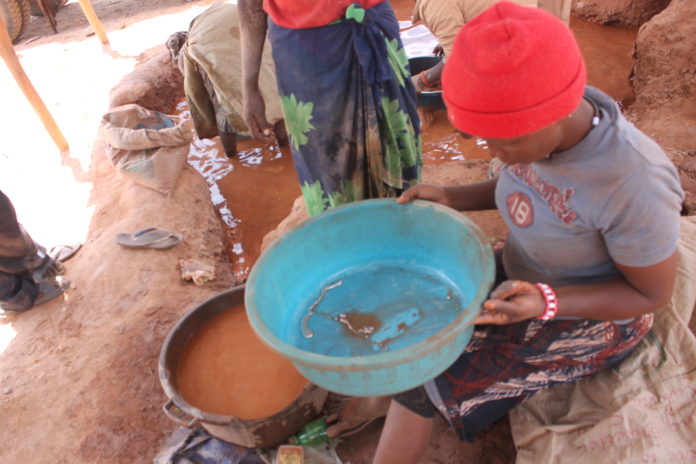It’s before sunrise but artisanal gold miner Rose Namukasa is already scouring muddy water for small nuggets of gold in this mining area in Mubende, central Uganda, one of the largest gold mining headlands in the country, where mercury is a staple.
Armed with a basin, the 30-year old mixes muddy water with mercury with her bare hands without protective gloves, ignoring the risk of mercury poisoning, an early link to wide-ranging mercury pollution that has affected most gold mining areas of Uganda.

“If I don’t work what will my 4 children eat? they will starve, I don’t have money for gloves either,” says the single mother.
A gold rush in Uganda has spiked demand for mercury as artisan miners seek to cash in on the highly demanded precious metal amid climbing international prices.
Namukasa is among the over 300,000 artisan and small-scale gold miners in Uganda who produce most of the country’s gold while they risk their lives every day, working in dangerous conditions.
“Mercury use is totally unacceptable and the government will revoke licenses of miners that are found using this dangerous chemical,” said Sarah Opendi Achieng the Minister of State for Energy and Mineral Development, at a recent national citizens’ conference on mining.
Uganda’s mining sector is dominated by artisan and small scale miners whose activities are largely unmonitored and unregulated. In gold mines, mercury is used to recover pieces of gold mixed in soil and sediments. Mercury and gold are combined together to form a gold-mercury amalgam. Gold is then extracted by vaporizing the mercury. The remnants of this amalgam then percolate into the soil or flow to the nearby environment, eventually finding their way into water streams. This poses a great danger to local communities and the environment in gold mining areas.
Although mercury is a naturally occurring element, it is highly toxic to humans, animals, and the environment when not handled properly. Prolonged and high exposure to mercury by inhalation damages the nervous, digestive, and immune systems.

A recent research report by Water Governance Institute a local environmental organization titled Mining Industry’s Compliance to Social and Environmental Safeguards in Uganda found that mercury levels around gold mining areas of Kitumbi and Kasana sub-counties in Mubende were four times higher than the safe limit established by the World Health Organization WHO. The researchers analyzed 20 samples of water and soil collected from different gold mining sites where mercury is used including gardens and water bodies around these mining sites.
The report co-author Henry Bazira says that gold mining communities need to be monitored and educated about the dangers of using mercury in gold mining.
“Mercury pollution is a serious issue not just for communities in Mubende but the entire population is at risk of exposure because of the cumulative effect of mercury releases in the environment,” he said.
The report also states that several gold miners interviewed complained of unusual symptoms such as convulsions, loss of muscle coordination, miscarriages, paralysis, anemia, and tremors all of which are symptoms of mercury poisoning.
“No bio-monitoring of mercury effects on humans has been undertaken in Uganda and we lack capacity at medical level to fully diagnose mercury-related ailments,” says Bazira.
He adds that the government should work towards making alternatives such as borax affordable and accessible. “Borax is a better option because it breaks down in water due to its high affinity for oxygen but remains expensive for these communities”

Mercury use in gold mining also flouts the Minamata Convention on mercury which Uganda became a signatory to in 2013. The objective of the convention is to protect human health and the environment from the anthropogenic emissions and releases of mercury and mercury compounds. Article 3 of the convention, seeks to reduce global mercury pollution through complementary measures to minimize mercury supply and demand.
Mercury pollution is also one of the causes of climate change that is already a reality in Uganda. Mercury’s interaction with air forms mercury oxide which contributes to the depletion of the ozone layer. Smuggling of mercury across the country’s porous borders is also common.
Uganda is endowed with a vast array of metallic and industrial minerals that have the potential to be developed commercially however most of these remain essentially under-developed.
The increase in international commodity prices triggered a number of processes in the country including putting in place laws to guide and govern the emerging minerals sector and conducting aerial-magnetic geological studies to determine the mineral deposits in the country.
A World Bank-funded survey divided Uganda into six blocks and found that western Uganda, which borders the mineral-rich but restive Eastern Congo the most endowed. The country’s central region also holds huge potential.
Three years ago, a Belgium-based refinery set up a $20 million gold plant in the country. Statistics from the ministry of trade indicate that gold exports fetch $1 billion every year and have overtaken coffee as Uganda’s leading export commodity.
According to Vincent Kedi the Principal Engineer on mining at the Ministry of Energy and Mineral Development of Uganda, the new legal framework to govern mining activities in the country -the mining and minerals bill 2019 will soon be tabled in Parliament.
The old law which is the mining act of 2003 was lax on enforcing compliance to social and environmental safeguards in mining activities, penalties for noncompliance as well as mitigation and rehabilitation strategies.
“We are trying to expedite the process to put in place a new mining law. The new law has taken great care to address most of the challenges in the sector including mercury use in gold mining and stringent penalties for environmental degradation ”. He added that monitoring mining activities had been affected by the outbreak of COVID-19 and the national lockdown.

